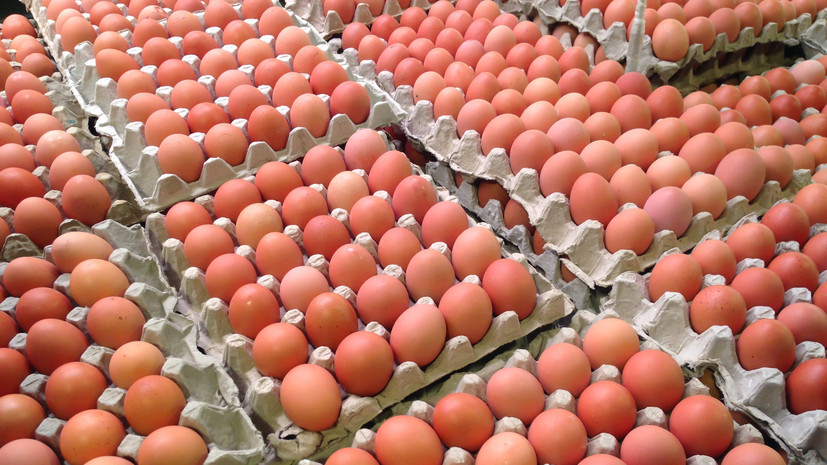Retail prices for chicken eggs in Russia are falling for the second week in a row after a boom in previous months.
This is evidenced by materials from the Federal State Statistics Service published on Wednesday, January 24.
According to the department, if from January 1 to January 9 the average cost of a product on Russian shelves increased by 0.78%, then from the 10th to the 15th the figure decreased by 0.2%, and from the 16th to the 22nd e - by 1.41%.
For comparison: in November - December 2023, the price of goods increased weekly by more than 4%.
As previously reported by the Ministry of Agriculture, over the past few weeks, chicken egg producers have begun to reduce prices for their products.
This, in turn, began to have a positive effect on price tags in stores.
“As expected, the dynamics of the cost of eggs in the wholesale segment is also reflected in retail, which is confirmed by Rosstat data.
According to estimates, this trend will continue in the near future,” TASS quoted the Ministry of Agriculture as saying.
RIA News
© Natalya Seliverstova
Let us note that chicken eggs on the shelves of Russian stores began to noticeably rise in price in the early autumn of 2023, and based on the results of the entire last year, their average cost increased by more than 62%.
This is approximately eight times higher than official inflation (7.4%).
The main reasons for this dynamics were high consumer demand and the government’s untimely response to the situation in the food sector.
Russian President Vladimir Putin announced this on January 11 during a meeting with entrepreneurs of the Far Eastern Federal District in Khabarovsk.
“We just didn’t get our bearings in time.
Our production volume has not decreased, consumption has increased.
In connection with the real disposable income of the population, people’s incomes increased a little, but still a little, they began to buy more eggs and chicken meat, but they didn’t think about opening imports in time, boom!
— and prices went up,” explained the head of state.
In addition to high domestic demand, the sharp price jump could be partly provoked by fluctuations in exchange rates and, as a consequence, an increase in the cost of foreign equipment and raw materials.
This point of view was expressed in a conversation with RT by Georgiy Ostapkovich, director of the Center for Market Research at the Institute of Statistical Research and Economics of Knowledge at the National Research University Higher School of Economics.
“The fact is that our egg production structure has a fairly high import component, and the ruble exchange rate was not very stable last year.
Poultry farms' costs increased and they were forced to raise prices.
At the same time, other sources of animal protein, primarily chicken, also became more expensive, so Russians began to more actively switch to a cheaper source - eggs.
As a result, demand exceeded supply, and a shortage formed on the market,” Ostapkovich explained.
Back in December 2023, Vladimir Putin drew attention to the situation, and after the president’s remarks, the Ministry of Agriculture began to work on a whole range of measures to eliminate the problem.
In particular, the authorities decided to eliminate import duties and increase supplies from friendly countries, as well as increase their own production and transfer poultry farms with distribution networks to long-term contracts to ensure projected volumes and stable prices.
Gettyimages.ru
© Tonktiti
“Government measures, especially on duty-free import of eggs from friendly countries, have proven to be effective.
Also, previously observed outbreaks of poultry diseases at enterprises have stopped, chicken meat prices have stopped rising - for a number of items there is now a price rollback.
In addition, after the end of the New Year holidays, the consumption of eggs, which were actively purchased for salads, began to decline.
All this contributed to the reduction in price of the product,” Ilya Bereznyuk, managing partner of the Agro & Food Communications agency, told RT.
At the same time, the specialist does not yet expect prices to return to the level of the beginning of last year, since producer costs still remain high and companies need to maintain their business plans.
Georgy Ostapkovich shares a similar point of view.
“Of course, the authorities helped poultry farms financially so that they could increase production.
As a result, prices began to decline, but are unlikely to return to their original positions.
However, if you look at world statistics, then in Russia the prices for eggs are among the lowest - cheaper only in Sri Lanka and Cameroon.
At the same time, for example, in the EU, a dozen eggs cost about €2.5-3 (240-290 rubles -
RT
),” added Ostapkovich.

